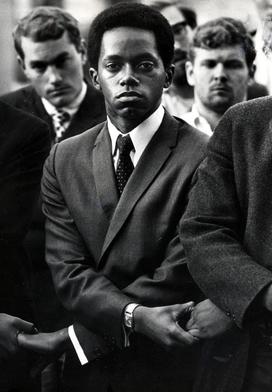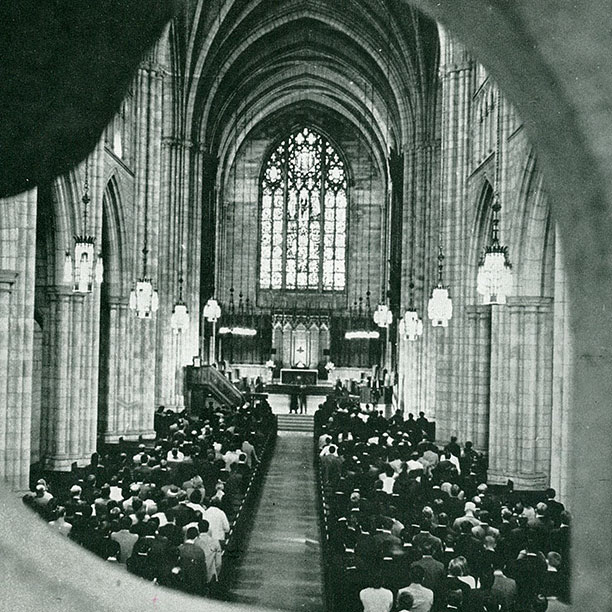
President Robert Goheen ’40 *48 initially opted to hold regularly scheduled classes on April 9, the day of King’s funeral, but when 30 members of the Princeton Association of Black Collegians voiced their objections in a meeting at Goheen’s home, the president agreed to suspend classes in King’s honor. Another chapel service was held, this time with the Association of Black Collegians at the fore, and it was followed by discussions of race relations in Alexander Hall, which drew some 1,000 students.
On April 10, the Association of Black Collegians was scheduled to host a conference on “Black Awareness,” with representatives from 50 colleges in attendance. Edward D. Sullivan, a scholar of French and comparative literature, was Princeton’s dean of the college at the time and delivered the opening address, calling on students “to look beyond anger. For anger does not build anything, anger does not put the pieces together, does not ultimately reach any goal.” The text of his address, which was reproduced in PAW, appears below.
“Beyond Anger”
Dean of the College Edward D. Sullivan’s address to the Association of Black Collegians’ April 10, 1968, conference
(From the April 30, 1968, issue of PAW)
Last year, Princeton’s Association of Black Collegians organized the first meeting of this kind and I am sure that those of you who attended that meeting were struck, as I was, by the free communication which was established, by the number and variety of points of view expressed — and expressed with eloquence and vigor. It seems to me that many of you found in that meeting an instrument of self-discovery, of some sense of yourselves as a group, but not — clearly not — as a single-minded homogeneous group. You worked together as a group of intellectuals, disagreeing frequently, even on fundamental issues, but wrestling with vital problems using all the available resources of mind and heart.
We meet here today under the shadow of a terrible event. From the senseless murder of a good man it is hard to derive any comfort, draw any moral, or obtain any guide to conduct. Martin Luther King has joined the ranks of the martyrs: his influence, instead of being exercised directly by him, now becomes symbolic and will be exercised by others. Martin Luther King, as is the fate of martyrs, no longer controls any part of his own destiny. Whatever meaning can be given to his martyrdom depends not on him, but on all of us who live after him. This is the terrible responsibility of each and every one of us, black and white: to transform a senseless act into a meaningful martyrdom. How we are going to face that responsibility is, I believe, the profound subject of the meeting you are about to embark upon.
Let me, if you will, develop one brief theme which may only set a tone rather than attempt to point a precise path. These are very general observations and obviously much more needs to be said and done. It seems clear to me that the most important development in the history of black people in America is their recent thrust toward a sense of their own identity, their seeking out of their cultural roots and values, their emphasizing their common and unique qualities — instead of trying to act like whites, to discover themselves as blacks. This is all to the good — something that must take place in one way or another before anything else can be achieved. It is not until black people feel easy, relaxed, confident and prideful about being black, that they can feel easy about being Americans.
But, if this self-awareness, this pride, this search for roots are all good and necessary and need to be developed further, your task, the task of the group represented here, is to look to the day when this sense of pride will be unchallenged and secure, when other, more wide-ranging goals will have to be realized. It is your task to look ahead — a considerable distance perhaps (but someone must do it), to the place of the black man in American society: what do you want it to be? Mere contentiousness is not enough: eternal violence and perpetual revolution are hardly sensible goals, however tempting they seem at a given moment. What do you want? What are your ultimate goals?
A great event took place here in Princeton yesterday, a series of dialogues between whites and blacks, in small groups, exploring common problems, speaking frankly to each other. Much credit is due to the Association of Black Collegians and the ICAA (Informed Citizens Against Apathy), the white group which sprang into existence only recently and which hopes to provide an instrument for continuing these contacts over a long period. It was an extraordinarily successful event in terms of the numbers who responded, who packed Alexander Hall with 1,200 people and filled the classrooms for the rest of the afternoon in small groups. It was more than anything else a model of how blacks and whites can work together. ABC and ICAA put together a smoothly functioning operation between Monday afternoon and Tuesday morning — a remarkable technical achievement, as well as a heartening experience. I congratulate all who participated.
As I attended several of the groups yesterday, I saw certain themes emerge, and, above all, certain problems arise. These are not so much problems as temptations, and these temptations beset you, too, as you begin your conference. It may be useful therefore to be remind that these pitfalls exist — those terrible temptations which appear to provide easy solutions to hard problems. There are three that I see as particularly tempting at the present moment.
First is the intellectual temptation to talk about “the system” and to talk about changing it, as if there were system — a single, coherent, highly structured, deliberately contrived and rigorously directed system. It would be much easier if this were the case — it would be as simple as replacing one tape cartridge by another — just a new package that you slip in. To talk of “the system” is a form of intellectual laziness: it allows for infinite talk but, since it underestimates the complexity of the problem and the incoherence of the so-called system, it cannot result in effective action.
Second is the temptation of rhetoric: to be carried by feelings you cannot contain to words that you cannot mean. This is a temptation to which we have all succumbed at one time or another. The beautifully controlled rhetoric of Martin Luther King shows how effective rhetoric can be and can serve as a model to which we can aspire, but some are tempted to let their rhetoric run riot, to let words take charge.
Third is the temptation of violence, the easiest way of all, requiring no thought, no ability, no knowledge, and providing the comforting sense that one is doing something and that nothing more needs to be done. Violence is abhorrent, but violence without purpose is an abomination.
It is easy to be angry, and there is — who can doubt it? — much to be angry about. Anger is even a comfort, a satisfaction, a temptation. But, as intellectuals, though your anger may flash, you have an obligation to look beyond anger. For anger does not build anything, anger does not put the pieces together, does not ultimately reach any goal — unless one’s goal is merely the extension of wrath or the achievement of chaos. For that is why you have gathered here — to look beyond anger; that is my theme: Beyond Anger. Recognizing many reasons for anger, you are aware that you must address yourselves with your minds as well as your hearts to the problems we all face and which we all face together. These problems lie beyond the reach of anger and violence, which can call attention to the problems, but cannot provide the solution. This is your role — the harder role by far — the role the reflective, rational man, burning with passion, with intensity, with anger, but applying your minds to the appalling problems of your world, of your country, of your city, of your college, of yourself.
In a world in which feeling is becoming more highly prized than reason, where the “gut-reaction” is, for many, more persuasive than analysis, I still believe our ultimate salvation resides in intellectual power. Without for a moment denying the force of violence and anger, I am certain that it is only by the collective application of our intellectual resources that we can hope to overcome the forces of evil. Let no one think that I am underestimating the power of those forces or the difficulty of the task. But let no one think either, that I underestimate the intellectual resources represented here, your capacity for effective action.












No responses yet